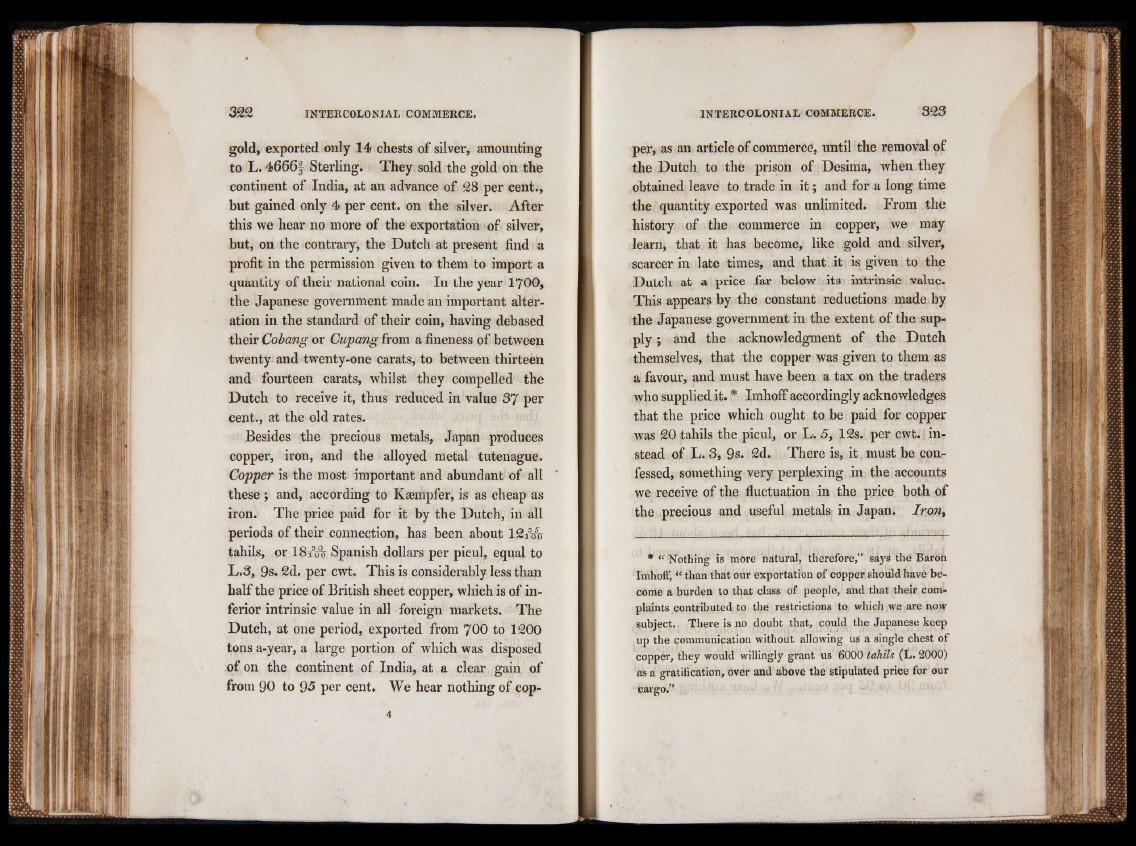
gold, exported only 14 chests of silver, amounting
to L. 4666§ Sterling. They sold the gold on the
continent of India, at an advance of 28 per cent.,
but gained only 4 per cent, on the silver. After
this we hear no more of the exportation of silver,
but, on the contrary, the Dutch at present find a
profit in the permission given to them to import a
quantity of their national coin. In the year 1700,
the Japanese government made an important alteration
in the standard of their coin, having debased
their Cobang or Cupang from a fineness of between
twenty and twenty-one carats, to between thirteen
and fourteen carats, whilst they compelled the
Dutch to receive it, thus reduced in value 37 per
cent., at the old rates.
Besides the precious metals, Japan produces
copper, iron, and the alloyed metal tutenague.
Copper is the most important and abundant of all
these j and, according to Kasmpfer, is as cheap as
iron. The price paid for it by the Dutch, in all
periods of their connection, has been about 12//o
tahils, or 18t5o°(t Spanish dollars per picul, equal to
L.3, 9s. 2d. per cwt. This is considerably less than
half the price of British sheet copper, which is of inferior
intrinsic value in all foreign markets. The
Dutch, at one period, exported from 700 to 1200
tons a-year, a large portion of which was disposed
of on the continent of India, at a clear gain of
from 90 to 95 per cent. We hear nothing of copper,
as an article of commerce, until the removal of
the Dutch to the prison of Desima, when they
obtained leave to trade in it; and for a long time
the quantity exported was unlimited. From the
history of the commerce in copper, we may
learn, that it has become, like gold and silver,
scarcer in late times, and that it is given to the
Dutch at a price far below its intrinsic value.
T his appears by the constant reductions made by
the Japanese government in the extent of the supply
; and the acknowledgment of the Dutch
themselves, that the copper was given to them as
a favour, and must have been a tax on the traders
who supplied it. * Imhoff accordingly acknowledges
that the price which ought to be paid for copper
was 20 tahils the picul, or L. 5, 12s. per cwt. instead
of L. 3, 9s. 2d.j There is, it must be conr
fessed, something very perplexing in the accounts
we receive of the fluctuation in the price both of
the precious and useful metals in Japan. Iron,
* “ Nothing is more natural, therefore,” says the Baron
Imhoff, “ than that our exportation of copper.should have become
a burden to that class of people, and that their complaints
contributed to the restrictions to which we are now
subject. There is no doubt that, could the Japanese keep
up the communication without allowing us a single chest of
copper, they would willingly grant us 6000 tahils (L. 2000)
as a gratification, over and above the stipulated price for our
cargo.”